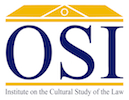May
12
2017

OSI
As the deadline for applications is quickly approaching (May 15), here is the final program for this year’s Osnabrück Summer Institute on the Cultural Studies of the Law. For one week this August, the OSI will provide young scholars interested in the intersections of Law and the Humanities with the opportunity to have in-depth discussions of current issues in the field, to share their work with their peers as well as experienced researchers, and to meet and exchange ideas with colleagues from around the globe.
The OSI 2017 will feature four core workshops:
- Claiming Interdisciplinarity in Cultural Legal Studies
- Claiming the Past, Belonging for the Future / Immigration, Citizenship, and Property
- Real and Performative Properties
- Cultural Productions, Contentious Properties
For the full program, please visit the program page.
Apr
27
2017

OSI
As the fourth workshop of this year’s OSI, we are happy to announce “Cultural Productions, Contentious Properties,” which will be convened by Danilo Mandic and Cristina S. Martinez. This workshop will deal with some of the questions around copying, appropriation, authorship, and copyright that have become particularly prescient in the 21st century.
This workshop explores and challenges the contentious properties that both law and culture inform and perform. Considering different forms of cultural production and expression, it seeks an understanding of property rights, legal fictions, artistic practices of copying and appropriation. Taking as a point of departure Michel Serres’s notion of ‘appropriation through pollution’ and extending it to current case studies we will discuss and examine contentious claims and negotiations. To what extent are we in need to (or, bound to) discuss cultural production through legal structures? The relation between authors and users and the division between private and public maintain an ongoing tension between dichotomous viewpoints manifested in different spheres of cultural production, particularly as these are intensified by the proliferation of digital technology and the challenges it has introduced with regard to production, distribution and use of cultural expression. We will explore the legal concepts of property/ownership/appropriation, and question the extent to which the processes of relations/communication both precede and inform them with an attempt to understand and challenge the dominating and expanding proprietary principles of copyright.
Apr
13
2017

OSI
The second workshop we want to introduce this week will deal with a variety of questions on claims to/of heritage and their implications. Workshop 2 “Claiming the Past, Belonging for the Future” will be convened by Marianne Constable and Leti Volpp. This is their abstract for this workshop:
Heritage, heredity, and inheritance all come from the past and yet their claims are not simply historical. Indeed, as present-day acts, claims of heritage set up what belongs to whom for the future. What kinds of claims are these? Are they distinct as claims? What is it to make or state or stake a claim? How are legal claims performed? What do claims, as speech acts, involve? Does every claim involve an assertion of fact plus a demand for recognition? When are claims as to heritage factual? When are they claims of law? To what do they appeal? And what sort of evidence do they call for? How does what counts as evidence of a particular claim change over time?
Drawing in part on the work of J. L. Austin on speech acts and referring to a small number of documents drawn from various legal contexts — particular statutes, local regulations, trial transcripts, and possibly UN documents — we’ll begin to touch on the complexity of these issues as they relate to cultural heritage and historic preservation. Readings will include scholarship about the 20th-century legal history of archeology and about encounters between different traditions.
Apr
10
2017

OSI
Starting this week, we will begin posting more information about the individual workshops and the conveners. We begin with Workshop 3 “Real and Performative Properties: Competing Claims to Citizenship, Indigeneity, and Land” with Beth Piatote and Sabine N. Meyer. Here is the introduction of their workshop at OSI 2017:
Scholars from various disciplines have long asserted the central role of property in the colonization of the North American continent and the emergence of the United States. The transformation of indigenous lands into private and federal property has been identified as a foundational aspect of American empire-building. Not surprisingly, debates about real property – land – dominated the relationship between Native Americans and the settler nation, particularly in the nineteenth century, in the context of the federal policies of removal and allotment. While the struggle over real property remains the bedrock of Native-settler relations, as the Standing Rock protests demonstrate, it has also generated conflicts over other, more metaphorical “properties,” such as the properties of citizenship (both tribal and U.S. citizenship) and indigeneity as such.
Continue Reading »


